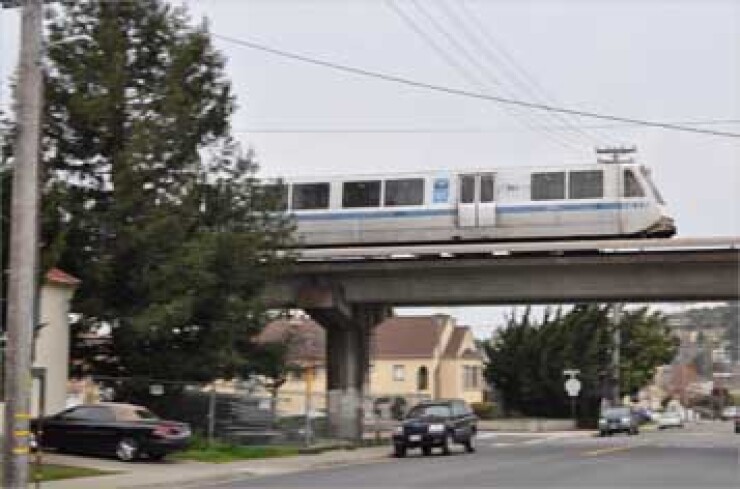
LOS ANGELES — The San Francisco Bay Area Rapid Transit District will bring $240 million of general obligation bonds to market next week to finance earthquake safety improvements throughout its system.
The bonds are tentatively scheduled to price on Wednesday, with a retail order period scheduled for Tuesday, according to Scott Schroeder, BART's Controller Treasurer.
JPMorgan is the lead underwriter.
The BART is among the highest rated transportation issuers in the U.S., with triple-A ratings from both Moody's Investors Service and Standard & Poor's.
The bonds are secured by an unlimited ad valorem tax in BART's prosperous service area, which includes San Francisco, Contra Costa, and Alameda counties.
"Property taxes to pay debt service on the current offering will be derived from one of the largest property tax bases in the state, which we expect will continue to undergo near-term growth," Moody's analysts said in a recent report.
The property tax base totals approximately $525.6 billion in assessed value for fiscal 2014 — a 4.6% increase over 2013, according to Moody's.
In addition to its large, diverse tax base, the district has an above-average socioeconomic profile and healthy financial profile, analysts said.
Challenges include an aging infrastructure and large capital project needs, as well as challenging labor negotiations. The district recently
The bonds are portion of a 2004 authorization for the district to issue $980 million of general obligation bonds. Two issues totaling $500 million have already been completed.
Proceeds of the sale are being issued to finance earthquake safety improvements throughout the three counties, including strengthening tunnels, bridges, overhead tracks, the underwater Transbay Tube, and the Berkeley Hills Tunnel.
The BART system consists of more than 100 miles of double track, more than 40 stations, and more than 46,000 parking spaces across the three counties. Its largest source of revenue is passenger ticket purchases, which saw a 10.8% increase to $406.9 million in fiscal 2013 due to ridership increases.
BART is expected to issue an additional $240 million in parity debt in the next two or three years, which will complete the 2004 authorization, according to Standard & Poor's.
The agency views the district's overall debt burden as moderate, at $5,425 per capita and 3.5% of market value.
Both Standard & Poor's and Moody's give the bonds a stable outlook.
"The outlook reflects our anticipation of continued stability within the Bay Area economy and our expectation that the underlying tax base will remain stable despite a modest decline in 2010 values," Standard & Poor's analyst Jennifer Hansen said in the agency's credit report. "Given the area's very favorable underlying economic indicators, coupled with BART's good and well-embedded financial management policies and procedures, we do not expect to revise the rating during the two-year outlook term."
Orrick, Herrington & Sutcliffe LLP is bond counsel and FirstSouthwest is financial advisor on next week's deal.





